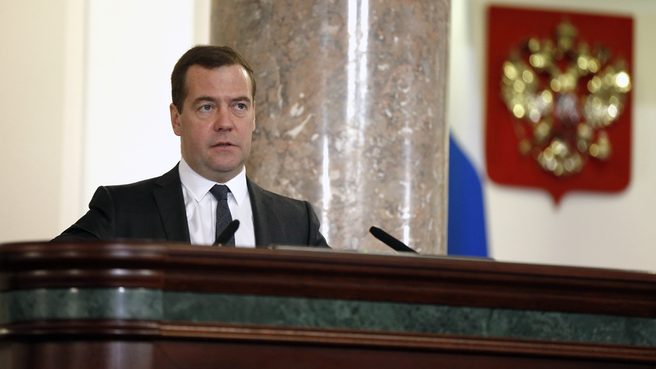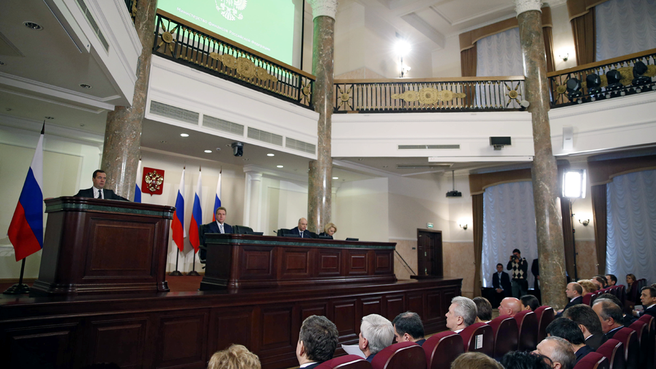Ministry of Finance’s performance during the year and fiscal policy tasks.
Excerpts from Dmitry Medvedev’s opening remarks:
The performance of the Ministry of Finance, the Government and our entire economy was complicated by a sharp deterioration in the oil market and sanctions against Russia.
We had to deal with many issues for the first time and on the move, including the complicated and unique task of integrating the Republic of Crimea and Sevastopol into the structure of the Russian Federation. This was an unprecedented task, but it has been resolved by and large.
We registered a certain economic decline in the beginning of this year, amounting to 1.9 percent in January and February. However, it appeared to be less than even moderate pessimists predicted, not to mention more radical forecasts. Suffice it to recall the reduction of the credit rating below the investment level. Moody’s laid the decline of the Russian economy by 8.5 percent in two years as the baseline scenario. This is probably yet another reason to consider upgrading the use of rankings both in Russia and the rest of the world.
This year, we have made a number of decisions on protecting our economy against the influence of negative factors. We were able to do this in light of the accumulation of money in sovereign funds and last year’s decision to establish an anti-crisis fund from unspent allocations.
We promptly adjusted the 2015 budget proceedings to reflect a more realistic average annual oil price -- $50 per barrel of Urals.
Anti-crisis plans did not prevent us from continuing to upgrade the tax system and improve conditions for business. We introduced many novelties into the law to encourage organisations that have a status of resident of a priority development territory. The regions have received the right to introduce tax holidays for the newly-registered individual entrepreneurs who enjoy simplified taxation procedures and work in the production, social and scientific fields. In addition, we have launched what is called a large tax manoeuvre in the fuel-and energy complex. It provides for stage-by-stage reductions in customs duties on oil, excise duties on petroleum products and a simultaneous increase in the mineral extraction tax on oil-and-gas condensate. This manoeuvre is obviously producing a certain effect.
We took a number of other measures to increase transparency in the taxation of business, including a law on tax on profit of the controlled foreign companies. We introduced definitions of legal entities’ tax residency and a de facto income recipient for the application of international agreements on avoiding dual taxation. This year, a transition has already been launched on calculating real estate tax based on a property’s cadaster value.
Russia has expanded its participation in the work of international financial agencies. In perspective this should reduce the dependence of our economy on foreign policy risks (that we have faced once again). The BRICS countries have signed an agreement on their New Development Bank that will become an institutional foundation for their unification and will demonstrate their enhanced influence in the world.
The BRICS countries have also decided to establish the BRICS Contingent Reserve Arrangement. It will help them activate the mechanism of mutual support if their national financial systems experience dollar liquidity problems that periodically come up. Initially, the reserve will contain $100 billion. Later this year, we will hold the BRICS Summit in Ufa.
We have developed cooperation with our neighbouring countries. The Eurasian Economic Union (EAEU) has been launched. Many major agreements with other states, in part, on the union’s first free trade area with Vietnam are about to be signed. Last year, Russia and Kyrgyzstan established a joint development fund. Kyrgyzstan is expected to join the EAEU in May.
Now I’d like to say a few words on current and future tasks.
We must ensure the stability of our budget system and preserve enough budget resources.
Moderate debt burden is one stabilising factor. We must keep this competitive advantage of ours. It is essential to increase investment and labour productivity. This is our task for the future.
Since October 2014, the Government’s special commission has worked to improve the quality of state programmes. It reveals ineffective measures and budget expenses.
We must pursue a smart tax policy. We plan to enhance the appeal of Russian jurisdiction for business, support and encourage the return of capitals to the country, including those assets that were registered in the name of nominal owners or those that were not declared before in the context of the draft law that is currently under discussion.
As part of our anti-crisis plan, in the near future we are going to increase opportunities for the application of special tax procedures, introduce a license for self-employed citizens and give them an opportunity to pay taxes and insurance premiums on a one-stop shop service principle. We are also considering amendments to laws aimed at giving tax benefits to so-called greenfields, that is, new industrial enterprises within the limit of their total capital expenses.
We must continue strengthening our financial system. The Bank of Russia has created the conditions for reducing interest rates. We are also jointly carrying out the programme on the follow-on capitalisation of the banking system.
Since the very start, we have based the performance of every ministry and department on the principle of openness. This is a characteristic feature of the current Government. We must continue with this approach today.














